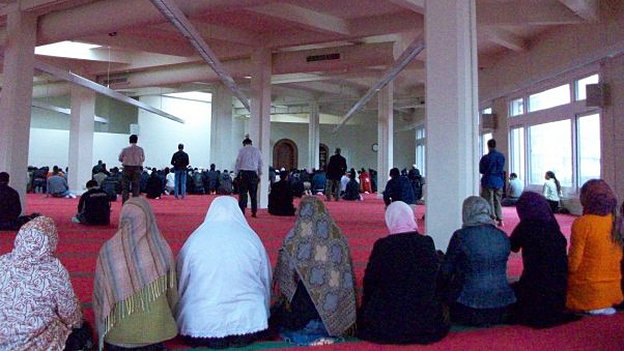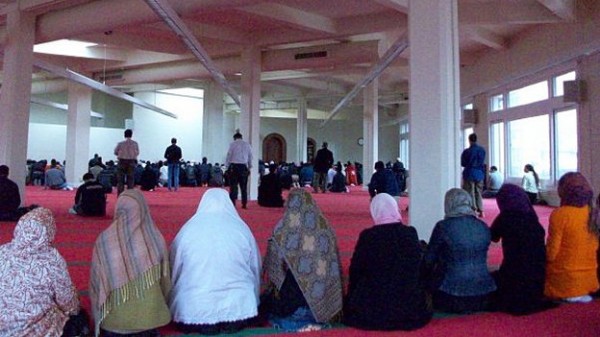
By: Monique Parsons
Source: http://www.npr.org/
Most American mosques do a poor job of including women, according to a recent study co-sponsored by the Islamic Society of North America. Sometimes that means subpar women’s prayer spaces, a lack of leadership roles or little programming relevant to women.
For Edina Lekovic, a recent visit to a mosque meant being asked to use a separate entrance from the one men use. Lekovic works for the Muslim Public Affairs Council and sits on a regional Islamic advisory board in Southern California. She goes to mosques a lot for meetings and Friday prayers.
“I was walking towards the front door only to be told by a boy of no more than 12 years old — he pointed to the side of the building and said, ‘Oh, the sisters’ entrance is over there,’ ” she says.
Lekovic is religious: She covers her hair and doesn’t mind praying separately from men as is Islamic custom. But entering through a different door? “And I sort of stopped dead in my tracks and looked around for an adult figure that I could have the conversation with,” she says.
Nobody else was around. “So I looked at this 12-year-old boy and said, ‘There’s a separate entrance for women? Why is that?’ just to see what he would say, and he sort of shrugged his shoulders and said, ‘It just is,’ ” she says.
Lekovic is also a teacher, and she decided to seize the moment. “My final response to him was, ‘Well, the mosque that I go to on the other side of town has everybody walk through the same set of doors,’ ” she says.
Lekovic says there was a time she might have slipped in the side entrance, quietly fuming. But things are changing. Just a few years ago, a woman’s place in the mosque was a fringe issue.
“There was to some degree pushback around this, like, ‘We’re dealing with enough challenges right now,’ that you know, ‘Wait your turn’ was kind of the attitude,” Lekovic says. “Today more and more women are saying, ‘Now is the time.’ ”
Lekovic says there is a rich history of Islamic teachings that preach equality for women. But she also gives credit to a 34-year-old Chicago woman named Hind Makki. Last year, Makki started an online project called Side Entrance, where women from around the world share photos of their prayer spaces. Not all the photos are negative. Submissions range from isolated, moldy storerooms to soaring, lushly carpeted halls.
“The tag line is: ‘We showcase the beautiful, the adequate and the pathetic,’ ” says Makki.
The project began when she snapped photos of women’s prayer spaces in some Chicago mosques and posted them on her Facebook page. One showed women praying behind a tall room divider, blocking views; another looked like a walk-in closet with a curtain-covered window. The photos went viral.
“I got a lot of response, and one of the most interesting type of responses I got was from men who had no clue,” Makki says.
While some accused her of airing dirty laundry, many Muslim men started asking how they could help.
“They just had no idea that this was somewhat typical of women’s experiences at a mosque — that you go to a mosque and you don’t see a dome; you don’t see the imam, certainly; you don’t see the architecture — you see a big wall in front of you,” she says.
Shahina Saeed is on the board of directors of the Islamic Society of Orange County, one of the oldest and largest mosques in Southern California.
“I’m surprised that in a big city like Chicago there’s a place like that where the women can’t even see what’s going on in front of them. I would not be comfortable in a space like that,” she says.
At the Islamic Society of Orange County, women pray in a big loft with an outdoor patio and views of the imam and the mosque’s colorful glass dome. They can also pray on the main floor in an area beside the men. Saeed says she feels at home here. The Islamic Society of North America study found that more women showed up for events at mosques like hers: those with female board members, female speakers and attractive women’s prayer spaces.
Lekovic says this conversation is about more than side entrances.
“Part of what’s at stake is the question of where Muslim women will put their talents. Now, if the mosque is an environment in which they see that the fruits of their labor will be beneficial to the community, they will put their time and energy there,” she says.
National Muslim leaders are paying attention. The Islamic Society of North America is urging mosques to recruit more female board members, and a recent conference centered on a campaign to improve women’s prayer spaces.




